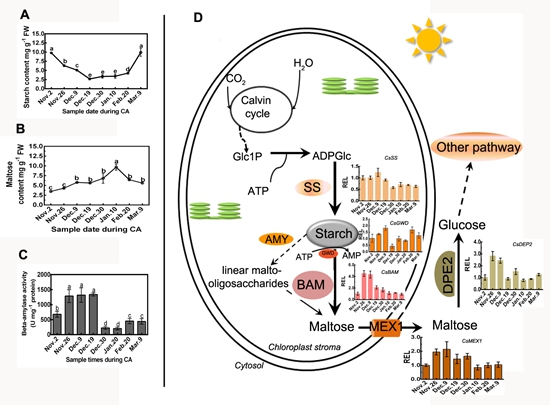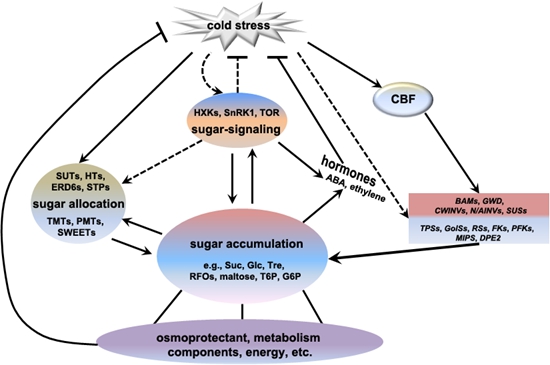分享到
CAAS Researchers Reveals Effects of Cold Acclimation on Sugar Metabolism and Sugar-related Gene Expression in Tea Plant during the Winter Season
Tea plant (Camellia sinensis) is a temperate woody plant, whose leaves are consumed as a beverage around the world, and is susceptible to low temperature. It’s growth and geographical distribution are regulated by temperature. Therefore, the study of cold response mechanism of tea plant is of great significance for breeding high resistance and quality tea varieties.
Since the 12th five-year plan, under the supports of multiple projects including Natural Science Foundation of China, a series of important progresses have been made in the mechanisms of tea plant respond to cold stress at the molecular levels by the Innovation Team of Tea Plant Genetics and Breeding from Tea Research Institute (TRI). They firstly employed RNA-Seq and digital gene expression technologies to the study of genome-wide expression profiles and identified 1,770 differentially expressed transcripts during cold acclimation (CA) in tea plants; in addition, pathway analysis indicated that the “carbohydrate metabolism pathway” and the “calcium signaling pathway” might play a vital role in tea plants’ responses to cold stress. On this basis, a variety of stress-related genes such as the transcription factor of bZIPs and the genes encoding enzymes involved in the metabolism of glycine betaine and glutathione respectively, were isolated and investigated in tea plant. Moreover, they also successfully identified over 20 aquaporin (AQP) genes and explored their expression patterns under stresses. These results let us to further know the molecular mechanism of tea plant response to low temperature.

Starch metabolism and key gene and / or enzyme activity changes during the CA process.
Carbohydrates, especially of soluble sugars, play an essential role in plant cold tolerance; however, the molecular regulation of tea plant in response to cold is unclear. Recently, the researchers investigated the physiological changes including sugar contents and ultrastructure alterations in tea plants during CA, indicted that the content changes of sugar (e.g. starch, and sucrose) were correlated with the cold-tolerance of tea plants. They observed that CA induced starch degradation, which was responsible for the increase of soluble sugar content contributed to tea plants tolerance to cold. Additionally, more than 59 genes involved in the sugar metabolism, transportation, and signaling pathways were isolated, and their expression profiles were also detected over the course of a consecutive two-year assay in the winter seasons from 2012 to 2014. These results provided a comprehensive insight into the effects of CA on carbohydrates indicating that sugar accumulation contributes to tea plant cold tolerance during winter season, and a simply model of sugar regulation in response to cold stimuli is proposed.

A model of sugar regulation in the plant response to cold stress
Since the 12th five-year plan, under the supports of multiple projects including Natural Science Foundation of China, a series of important progresses have been made in the mechanisms of tea plant respond to cold stress at the molecular levels by the Innovation Team of Tea Plant Genetics and Breeding from Tea Research Institute (TRI). They firstly employed RNA-Seq and digital gene expression technologies to the study of genome-wide expression profiles and identified 1,770 differentially expressed transcripts during cold acclimation (CA) in tea plants; in addition, pathway analysis indicated that the “carbohydrate metabolism pathway” and the “calcium signaling pathway” might play a vital role in tea plants’ responses to cold stress. On this basis, a variety of stress-related genes such as the transcription factor of bZIPs and the genes encoding enzymes involved in the metabolism of glycine betaine and glutathione respectively, were isolated and investigated in tea plant. Moreover, they also successfully identified over 20 aquaporin (AQP) genes and explored their expression patterns under stresses. These results let us to further know the molecular mechanism of tea plant response to low temperature.

Starch metabolism and key gene and / or enzyme activity changes during the CA process.

A model of sugar regulation in the plant response to cold stress
This work was supported by the National Natural Science Foundation of China (31170650), the Natural Science Foundation of Zhejiang Province (Z3100473, LY14C160001), the Earmarked Fund for China Agriculture Research System (CARS-23), the Major Project for New Agricultural Varieties Breeding of Zhejiang Province (2012C2905-3) and the Chinese Academy of Agricultural Sciences through an Innovation Project for Agricultural Sciences and Technology.
This work has been published on Plant Molecular Biology on July 28th 2015. More details are available on the links bellow: http://link.springer.com/article/10.1007/s11103-015-0345-7
This work has been published on Plant Molecular Biology on July 28th 2015. More details are available on the links bellow: http://link.springer.com/article/10.1007/s11103-015-0345-7
Latest News
-
 Apr 18, 2024Opening Ceremony of the Training Workshop on Wheat Head Scab Resistance Breeding and Pest Control in Africa Held in CAAS
Apr 18, 2024Opening Ceremony of the Training Workshop on Wheat Head Scab Resistance Breeding and Pest Control in Africa Held in CAAS -
 Apr 03, 2024IPPCAAS Co-organized the Training Workshop on Management and Application of Biopesticides in Nepal
Apr 03, 2024IPPCAAS Co-organized the Training Workshop on Management and Application of Biopesticides in Nepal -
 Mar 28, 2024Delegation from the School of Agriculture and Food Science of University College Dublin, Ireland Visit to IAS, CAAS
Mar 28, 2024Delegation from the School of Agriculture and Food Science of University College Dublin, Ireland Visit to IAS, CAAS -
 Mar 25, 2024Director of World Food Prize Foundation visited GSCAAS
Mar 25, 2024Director of World Food Prize Foundation visited GSCAAS -
 Mar 20, 2024Institute of Crop Sciences (ICS) and Syngenta Group Global Seeds Advance Collaborative Research in the Seed Industry
Mar 20, 2024Institute of Crop Sciences (ICS) and Syngenta Group Global Seeds Advance Collaborative Research in the Seed Industry
